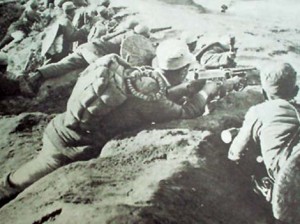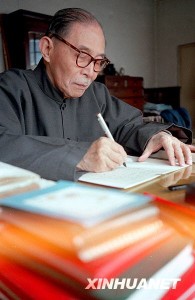History of the PRC – Part Sixteen Posted by sasha on Mar 15, 2011 in Uncategorized
With the Japanese occupation of Wuhan, the KMT reestablished the government in Chongqing. Chiang Kai-shek refused to negotiate unless Japan agreed to withdraw to its pre-1937 borders, but they did not budge an inch. Resilient Chinese forces were taking their toll on Japan’s military, and as a result the Imperial General Headquarters of Japan ordered massive air raids on Chongqing and other cities. The result – millions of Chinese left either homeless, injured, or dead.
In 1939, China would claim unexpected victories in Changsha (长沙) and Guangxi (广西). However, the damage that had been done to Chiang’s forces was too great, and offensive campaigns could not be undertaken. At the time, China received little help from the outside, its supplies were inadequate, and its resources were insufficient. Despite all of China’s problems, though, Japan still had a hard time gaining control. Guerrilla warfare waged by CCP forces had taken a serious toll on its military, and the atrocities committed by the Japanese army left them widely unpopular and quite ineffective.
Although CCP and KMT forces had suspended their civil war with the Second United Front years earlier, in reality there was very little cooperation between the two sides. Indeed, there was still plenty of tension between the rivals, and this would all come to a head in 1941, when Chiang had ordered the CCP New Fourth Army to evacuate Anhui and Jiangsu provinces. They agreed to leave, but on their way out were ambushed by KMT forces in what is known as the New Fourth Army Incident (新四軍事件 – Xīn sì jūn shì jiàn). On one side of history (that of the Republic of China), some say that this was a result of CCP insubordination, and that they were being punished for it. On the other side (that of the People’s Republic of China), this incident represented KMT treachery. Whichever side you take, one thing is clear – this ended any cooperation between them, and the two would continue fighting with each other as the war with Japan continued. Although as a result of this incident, the Communist Party lost possession of the lands south of Changjiang, it drew the party support from the population, which strengthened their foundations north of Changjiang. This historic incident is depicted by Chinese writer Shen Dehong (沈德鴻 – Chén dé hóng), whose pen name was Mao Dun (茅盾 – Máo dùn), in his novel “Putrefaction” (腐蝕 – Fǔ shí).
As the grueling war with Japan continued and the animosity between CCP and KMT forces reached a fever pitch, it seemed as if all hope was lost for China, especially considering very their limited aid from the outside world. Despite this bleak outlook, things would eventually turn around…

Build vocabulary, practice pronunciation, and more with Transparent Language Online. Available anytime, anywhere, on any device.
About the Author: sasha
Sasha is an English teacher, writer, photographer, and videographer from the great state of Michigan. Upon graduating from Michigan State University, he moved to China and spent 5+ years living, working, studying, and traveling there. He also studied Indonesian Language & Culture in Bali for a year. He and his wife run the travel blog Grateful Gypsies, and they're currently trying the digital nomad lifestyle across Latin America.






Leave a comment: